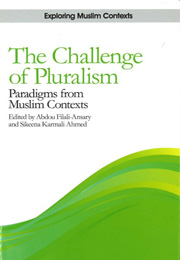Book contents
- Frontmatter
- Contents
- Introduction: Theoretical Approaches to Cultural Diversity
- PART ONE THE HERITAGE: HISTORICAL CONTEXTS
- PART TWO CONTEMPORARY THOUGHT
- 3 Civil Society and Conflict Management: Bangladesh's Experiences
- 4 Pluralism and Liberalism in Contemporary Islamic Thought
- 5 Democracy, Pluralism and Political Islam
- 6 Islam, Conflict and Democracy
- 7 The Diversity of Cultures in the Crucible of Globalisation
- About the Contributors
- Index
7 - The Diversity of Cultures in the Crucible of Globalisation
from PART TWO - CONTEMPORARY THOUGHT
Published online by Cambridge University Press: 12 September 2012
- Frontmatter
- Contents
- Introduction: Theoretical Approaches to Cultural Diversity
- PART ONE THE HERITAGE: HISTORICAL CONTEXTS
- PART TWO CONTEMPORARY THOUGHT
- 3 Civil Society and Conflict Management: Bangladesh's Experiences
- 4 Pluralism and Liberalism in Contemporary Islamic Thought
- 5 Democracy, Pluralism and Political Islam
- 6 Islam, Conflict and Democracy
- 7 The Diversity of Cultures in the Crucible of Globalisation
- About the Contributors
- Index
Summary
What does “globalisation” mean? The term came into general use in connection with the opening of the financial markets in London some years ago. This was to be the “Big Bang” that would suddenly tie financial transactions in different parts of the world into a single large and efficient market. To some extent we have seen the economies of many nations increasingly linked to the capital markets of the Western world. This is a major element of “globalisation” which brings out the “hegemonic power” of major financial interests that dominate our lives.
The “soft” cultural aspect is only one facet of the process of globalisation. There are other key matters: apart from economic linkages (and domination) of financial markets, there is also the political and military dimension. For example, the concerns of the international arms trade – which builds weapons of ultimate persuasion and terror, controls the trade in nuclear materials, electronic command-and-control systems, satellites, missiles and other similar matters that deserve serious attention. The control of weapons is a critical element of the “globalisation” agenda. Several things revolve around the definition and management of the international “agenda” concerning these matters, through all kinds of agencies and other forums. We know only too well how deadly and important these matters are, whether in Sri Lanka, Turkey or Japan. India, for example, discovered it in the Bofors story.
- Type
- Chapter
- Information
- The Challenge of PluralismParadigms from Muslim Contexts, pp. 94 - 109Publisher: Edinburgh University PressPrint publication year: 2009

